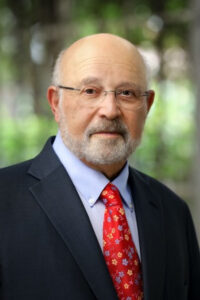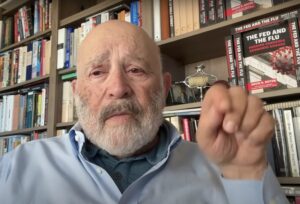The bond market expert says municipalities will be more on their own, predicts tax and service fee hikes.
By Johannes Werner
Original Air Date: April 16, 2025
Host: Hard times are likely ahead for the ability to borrow for the City of Sarasota, Manatee County and all the other municipalities on the Suncoast. That’s a prediction by bond expert David Kotok. Expect federal defunding, tariff wars and other executive measures to make big local ripples, says the founder of Sarasota-based investment outfit Cumberland Advisors.
Johannes Werner: David Kotok recently removed himself from the firm he founded, leaving it for the next generation to run. And that has freed him to be more frank about his insights. For one, he just published a book on the history of pandemics and their impact on economies, government and financial markets.
We took the opportunity to ask him about the current turmoil caused by tariff wars and DOGE cutbacks.
Kotok says the Trump administration’s measures have prompted a global shift.

David Kotok.
David Kotok: By introducing the tariff initiative, President Trump and his team have launched large volatility in financial assets, and that impacts bonds issued by various companies, governments, the federal government, state and local governments throughout the United States.
JW: Usually, when stocks go down, investors move to bonds, the more predictable but slow-rising debt instruments corporations and governments use to borrow. Not this time.
DK: When everything looks rosy, you want to own the stock market. When there’s trouble or you’re worried about trouble, you want to own bonds instead of stocks because you can’t depend on what’s going to happen with the stocks. This time around, under Trump, that didn’t happen. Stocks sold off viciously on the tariff announcement, but the bonds also sold off. That’s the unusual reference from history. Bonds went off, sold down in price. Stocks went off, went down in price. And that linkage was exacerbated because the U.S. dollar went down against the other major currencies in the world like the Japanese yen or the euro. So, we had a trifecta sell-off: stocks, bonds and our currency. And they’re all connected. And that’s what made this time unusual.
JW: How did the world’s central banks react to the Trump measures? They are moving away from the dollar and other currencies into gold. Also, Europe has taken a trillion-dollar turn that could suck global investors away from the United States.
DK: We also see interest rates changing elsewhere in the world, especially because in Germany there has now been a change of law, and Germany is committed to additional deficit spending to finance an enlarged role in defense. That’s a result of Putin and Russia invading Ukraine. That will probably take place throughout Europe and the eurozone, and we see those changes taking place. So what will the European Central Bank do? It has reduced interest rates. It has facilitated this expansion of borrowing. And I expect that to be in the trillions over the next ten years, five years, as Europe gears up for defense spending. Whether it comes at the expense of the U.S. markets in the future, of course, we’re not sure, cut so far that has been the case.
There is a regime change underway in the world, and how long it will be and how extensive it will be is unknown.
JW: In Florida, one of the biggest immediate impacts is from Trump’s tussles with Canada, says Kotok.
 DK: We chose to have a tariff war with Canada, one of our historically closest allies in the world. We have thousands of miles of a peaceful border with our neighbor to our north. We have an integrated military defense system between the United States and Canada that has operated for decades. And what did we do? We launched a tariff war—Trump launched a tariff war against Canada.
DK: We chose to have a tariff war with Canada, one of our historically closest allies in the world. We have thousands of miles of a peaceful border with our neighbor to our north. We have an integrated military defense system between the United States and Canada that has operated for decades. And what did we do? We launched a tariff war—Trump launched a tariff war against Canada.
What have the Canadians done? Well, he’s likely to have changed the politics of the country, Canada. We’ll know that on April 26th when we see the results of the Canadian election.
He has also alienated Canadian citizens. So, tourism from Canada to the United States has fallen off a cliff. And, of all the foreigners from all over the world, the largest cohort that comes to Florida, 3.3 million last year—3.3 million tourists visits in Florida—were from Canadians, and they’re not coming. Flights are off by 70%. In terms of the bookings, we can see the reservations. Restaurants, hotels—ask them, “Are you seeing as many Canadians?” I have been doing this around in some anecdotal economic research, and they say “No.” Fishing guide in Lake Okeechobee had five Canadian fishermen fish with him and hire him last year. This year, he has one.
The bottom line is we’ve pointed the gun and we’ve shot ourselves in the foot. And it hurts. And we’ve only begun to see the damage from the tariff war, in my opinion.
JW: Asked about the impact of the Trump measures on local governments, Kotok predicts they will be much more on their own. He begins with federal defunding.
DK: The policy has shifted from federal help for state and local governments and agencies to reduction or elimination of federal help and federal agencies. If you had a health care sector initiative; or a climate change or protection from hurricane initiative; or you wanted to have construction, sewer or water assistance; the federal government has essentially said, under the Musk-DOGE-Trump policies, “We’re not going to be there anymore. We’re taking this out of the federal budget. We’re not going to fund these things.” What that does is put in the hands of the state, the county, the city, the agencies of all types, the airport, the hospital—you name it—the agencies of state and local government municipal finance are enormous, and they are going to be more on their own. Are they going to raise money in the municipal bond market to fund projects? How are they going to do that in an economic downturn? What would you do if your revenue from tourism is falling and you want to have a development bond issue that appeals to tourists? What would the market? The bond market or say, “Wait a minute. This is a higher credit risk than it used to be.” Thank you, Trump administration. “We’re going to have you pay a higher interest rate to compensate us for taking the risk.”
JW: What will the consequences be?
DK: Higher local taxes or higher local user fees like your water bill or sewer bill. Higher airport fees, which will get passed through with charges to the airlines so we won’t see it. We’ll see it in the ticket price. And what do we do about hurricane defense? What do we do about FEMA and emergency management? What do we do about the issues of prevention of hurricane damage? Florida has had three major hurricanes. We still are not completely repaired and cleaned up. The shock of the federal policy change will continuously appear in Manatee and Sarasota counties. And who knows what the coming hurricane season is going to look like. We don’t. But what we do know is the risk is higher and the sea level is higher. That’s what we know.
JW: Is there a silver lining? Kotok says that these kinds of economic shocks in U.S. history were usually followed by political change.
DK: Usually, in a political environment like ours, citizens reach a breaking point because they’ve had enough pain and they change the government. Hoover had such a terrible recession and then depression that, in the election in 1932, their country rejected the whole political apparatus and threw them out and elected Franklin Roosevelt. An extended period of change ensued.
So, will we go through a cycle? We always do. How long will it last? You never know. What we do know is things will change and they will be dramatic. History says that’s the way it works, and trying to forecast the future is a very treacherous thing to do.
JW: Kotok spent the last four years writing a book titled “The Fed and the Flu,” which came out this February. Together with three co-authors, he examined the economic shocks that come out of pandemics, epidemics and plagues.
The main takeaway: Pandemics produce a concentration of wealth.
DK: The human being doesn’t seem to learn history. Now, maybe they would if there were a plague or pandemic every month or every year, but because of the gaps in time, history says the people and governments in government don’t seem to learn from the prior shock. And so the savings rate shifts to the rich, the divide between rich and poor widens and the excess savings—which are now more concentrated—have to be redeployed in the post-disease environment. Because there’s capital still there, what happens is there’s a change in interest rates and asset prices because of that. At the pandemic—plague—the per capita wealth goes up because people died. That is what makes it different from any other type of natural disaster. And it’s happening today. So, the disruption coming from governments has only mirrored what took place previously throughout history, whether it was in ancient Rome or COVID happening right now.
JW: One of the lessons from history is the need to deal with the lingering health effects of pandemics.
DK: That’s the nature of pandemics. They fade in the minds of people because they don’t want to deal with them anymore, but an extended period after a pandemic shock continues. Death rates are higher, and in this case of COVID, we have between 9 and 17 million disabled people in the United States. They are disabled today. Between 9 and 17 million. That’s the range of estimates. We don’t know how many. We don’t have good data. The governments have moved beyond this. We don’t record this information. We are struggling—researchers—to have treatments. And the whole defense research apparatus in the federal health systems has been eliminated by this new administration. So we don’t know.
JW: Reporting for WSLR News, Johannes Werner.
WSLR News aims to keep the local community informed with our 1/2 hour local news show, quarterly newspaper and social media feeds. The local news broadcast airs on Wednesdays and Fridays at 6pm.